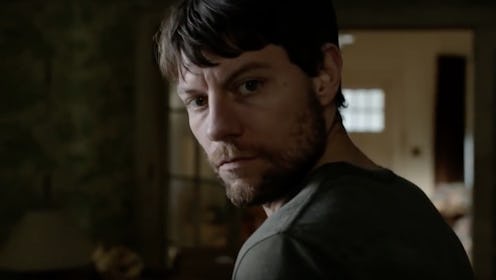Entertainment
How Patrick Fugit Relates To Being A Real Outcast

Patrick Fugit is, quite literally, the biggest outcast in the world of television. No offense to him. But with the premiere of Robert Kirkman’s (creator of The Walking Dead) new comic-to-TV adaptation, Outcast , Fugit’s character finds himself at the center of a southern town being rocked to the core with cases of demonic possession. Kyle Barnes (Fugit) is unknowingly the connection from victim to victim. Thus, they call him the “outcast.” For those who have yet to catch the latest Cinemax endeavor, know that Fugit kills it with his performance. The pretend yet totally legit southern accent alone got me. And although Fugit (who you may recognize from Almost Famous and Gone Girl) is brilliant at putting on a depressed, baffled and at times terrified face, there are elements of his real life that allow him to empathize with his character and pull inspiration beyond the script pages.
When I caught up with the actor in Los Angeles just before the show’s premiere, he was refreshingly candid about why he feels for Kyle and what made him feel like an outcast in his real life. “I was a weird kid. I grew up in Salt Lake City, Utah,” he tells me bluntly. And that’s just the start of it. Although Fugit’s upbringing was not quite as orthodox as those of other young boys in Salt Lake City, the way he owns and embraces it will automatically make you a fan.
First, there was the town’s strong sense of religion that made young Fugit feel like he didn’t quite fit in. “It’s predominately Mormon kids in my neighborhood where I grew up,” says the 33-year-old. “A lot of kids my age back then were baptized Mormon. I was not.” In fact, he and his family weren’t quite religious at all. “I mean, I was baptized Presbyterian,” he says, “But we went to church when grandma was in town and then Easter Sunday for the food. But other than that, my family’s not particularly traditionally religious.”
Fugit may have lacked involvement in religion, but not in the arts, which also set him apart. “There weren’t a lot of kids interested in acting or theater,” he says. “I made some very good close friends that all sort of had the same taste I did. We liked to burn G.I. Joes and watch Monty Python and take stage combat classes and things like that.” While he’s speaking, he has a pad and pen next to him, with doodles that look like the Outcast poster he would scribble and add to between every few questions. It’s clear creativity oozes through him.
This was my favorite: Fugit says while the other kids were playing sports, he was going to ballet rehearsal. “I grew up doing ballet. My mom was a ballet teacher; she had myself, my siblings, my cousins, all enrolled in ballet classes,” he explains. He isn’t bashful in the least. In fact, he owns it. “[It was] one of the best things in my upbringing in terms of my ability to have an elastic mind and learn things quickly and have discipline.”
So while the other boys were headed to soccer practice, Fugit boldly swam against the stream. “I was doing theater school in the summer, doing British accents with my best friends at school, wearing bowler hats,” he tells me. “We were f*cking weird kids.”
I can see exactly how his past of feeling like a misfit only benefited him in the long run. Other than being a bonafide cool and secure dude in my eyes, he takes pride in his craft—which he does a damn good job at, by the way. “You put all that together and you do not belong in Salt Lake City, Utah,” he says. Luckily, the silver lining is clear to him, as he realizes he wound up exactly where he’s meant to be. “But then it turns out, there’s a whole city full of weirdos that do the same sh*t.”
This is, after all, a city of dreams and Fugit is living proof that dreams will become reality when one's inner outcast is fully embraced.
Images: HBO (3)